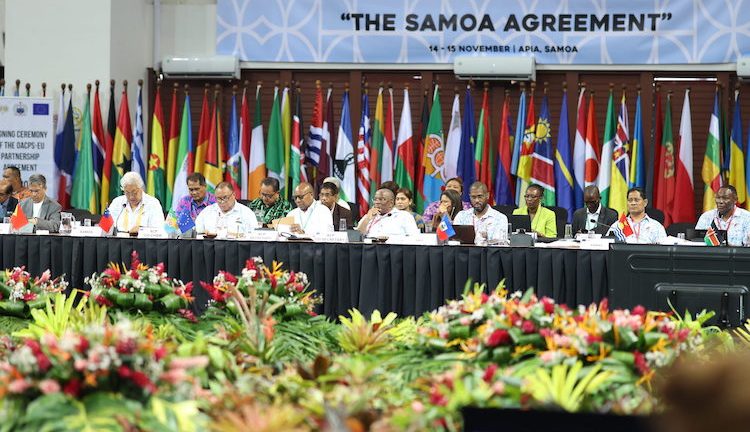By P.I Gomes
The writer is a former Ambassador of the Cooperative Republic of Guyana to the European Union and ACP Group of States, Brussels (2005 -2015) and Secretary-General of the ACP Group of States (2015-2020).
PORT OF SPAIN | 11 June 2025 (IDN) — On 6 June 1975 in Guyana’s capital city, the signing of the Georgetown Agreement and birth of the ACP Group of States was celebrated. That historic event is indelibly inscribed in the annals of unity and solidarity by post-colonial societies of sub-Saharan Africa, the Caribbean and Pacific.

Today in 2025, five decades of principled action, tensions and compromise tell a story of conviction and courage in pursuit of justice by countries which embraced self-determination with inspiration from the then-Non-Aligned Movement (NAM).[1]
The 46 countries that had gathered in Georgetown for the Agreement’s inauguration, comprised thirty-seven (37) from Africa, six (6) in the Caribbean and three (3) of the Pacific. Four months earlier on 28 February 1975 in Lomé, the Togolese capital in West Africa, they had all successfully concluded three years of serious and at times tense, negotiations with the then European Economic Community (EEC).
The historic, trans-continental, inter-regional Lomé Convention marked the beginning of the unique decades-long partnership of the ACP Group of States and Europe. In four revisions of the Convention (1975-1999), the unity and solidarity of the ACP Group were the foundation of intrinsic ties with Europe, that constituted an asymmetrical partnership between developing and developed countries. But it enshrined the pillars of “non-reciprocal trade, development finance cooperation and technical assistance”, with mutual respect for democratic values.
Evolution of Conventions from Lomé & Cotonou to Samoa.
The over-arching framework of the Georgetown Agreement provided the anchor of rights and responsibilities by ACP countries among themselves, with the wider world of developing countries and with Europe.
The First Lome Convention (1975-1980) celebrated the culmination of a process of “oneness and solidarity”, across differences in language, culture, geography and economic structures. The process also demonstrated the outstanding negotiating capability of a significant segment of the then Global South. The signatory countries had rejected “reciprocity in trade in goods”, securing from the world’s largest trading bloc, preferential prices and duty-free, non-reciprocal access to Europe’s markets.
This achievement of the ACP States earned incomes from Trade Protocols and Joint Working Groups on Banana, Cocoa, Rice, Rum and Sugar as principal commodities exported to European markets. Of these commodities, the highest income earners were Banana and Sugar, on which livelihoods of millions of farmers in the ACP countries depended.
The European Development Fund (EDF), a key pillar of the Convention helped production and productivity of ACP commodities but unfortunately rules of origin and restrictive upgrading of primary products prevented value addition and agro-processing by ACP countries, whose economies had been historically grounded in primary exports. As a result, while finance was available the process of “dependent development” was evident in the neo-colonial aspect of the ACP-EU partnership.
The Lomé Convention was renewed on three occasions
The Lomé Convention was renewed on three occasions from 1981-’85; 1985-’90 and subsequently for 10 years to 1999. By the time of the Cotonou Agreement, signed on 23 June 2000 in Benin, for a period of 20 years, the ACP Group was 79 member states. So too an enlarged Europe had become 28 by 2013.
The ACP Group and EU combined were a formidable membership of 107 in the United Nations. This potential to take joint action was tangibly realized by their participation in adoption of the 2015 Paris Agreement on Climate Change.
Other collaborative actions by the 10th EDF resources were the ACP-EU Spotlight Initiative against Gender-Based Violence (GBV) and the Global Climate Change Alliance-plus (GCCA+).
These examples of development finance cooperation from the Cotonou Agreement placed the ACP Group at the centre-stage of multilateralism, building strong ties with the UN Office for South-South Cooperation. This strengthened the “development” pillar of the ACP Group. But the ACP-EU “trade” pillar would face a fatal blow by the WTO demand for an end to non-reciprocity in trade, since it was granted by developed countries of Europe with the group of developing ACP countries and regarded as discriminatory against other developing countries, not members of the ACP Group.
Specifically, the EU was challenged and defeated at the WTO for non-reciprocal tariffs granted to ACP banana and sugar exports. To satisfy WTO-compatible trade, ACP suppliers were obliged to negotiate “regional” trade agreements. This was the de facto fragmentation of the ACP Group’s trade pillar to be replaced by contentiously negotiated, “regional” Economic Partnership Agreements (EPAs). Resistance, rejection and reluctance of ACP countries characterized the negotiations for WTO compatibility.
Moreover, negotiations on “trade” had new requirements on labour and environmental standards, principles on human rights and good governance with sanctions for corruption. All these became “trade” matters. By the time the Cotonou Agreement was nearing conclusion only the Caribbean and Southern Africa regions had reluctantly signed EPAs.
No longer a unified cohesive entity of developing countries, the fragmentation of the ACP Group had begun. This subsequently shaped negotiations from 28 September 2018 for a successor to the Cotonou Agreement scheduled to conclude in 2020. It was clear to both the ACP Group and the Europeans that the long-standing “trade and aid” agreement would be fundamentally different in post-Cotonou relations.
From the outset, the EU proposed regional divisions in three separate Protocols for Africa, the Caribbean and Pacific. This was rejected outright by the ACP Group which submitted a coherent negotiating position based on strategic Pillars, cross-cutting themes and common priority areas for all economic categories within the ACP Group[2]. The tense negotiations of almost three years resulted in a compromise consisting of a General Part, applicable to all Parties, appended to which were Three Regional Protocols. This constitutes the ACP-EU Samoa Agreement that was signed by 35 of the 79 member states on 15 November 2023 in Apia, Samoa. The turning point in ACP-EU relations had arrived.
Post-Cotonou, a Revised Georgetown Agreement & Future of OACPS
The post-Cotonou negotiations were undertaken in parallel with an ACP Committee to reshape the Georgetown Agreement relevant to the changing global geo-political context.
The era of non-alignment and shared perspectives with groups such as the G77, in the 1970s, were increasingly eroded by IMF/World Bank austerity measures and ACP countries faced heavy indebtedness. Moreover, trade liberalization, unstable markets, growing political conflicts within Africa and heavy migration to European countries created social and political conditions in which EU-ACP programmes of limited poverty alleviation, lacked the needed structural transformation of ACP economies.
In addition, preferential trade of the ACP Group with Europe had been weakened by regional EPAs that overshadowed “development issues” by emphases on governance, political dialogue, human rights, and peace and security, without sufficiently organic links to poverty eradication and justice as priorities of ACP countries.
Moreover, the European Parliament succeeded in having the EDF placed within the European budgetary cycle, thereby abolishing the exclusive “aid” instrument co-managed by the ACP Group and European Commission. This marked the collapse of development finance cooperation as mutually beneficial to the longstanding ACP-EU partnership.
The conjuncture of events showed that major amendments to the Georgetown Agreement were imperative for restoration of the centrality of unity and solidarity by the ACP Group and for a sound financial base to provide self-sustainability and reduce reliance on Europe’s generosity.
The Revised Georgetown Agreement is ambitious in portraying a maturing, trans-continental organization, positioned to be an effective player within the Global South, while deepening intra-ACP cooperation. It was endorsed unanimously at the 9th Summit of Heads of State and Government in Nairobi, Kenya on 9 December 2019. By its entry into force on 5 April 2020, the ACP Group of States has been designated the Organisation of African, Caribbean and Pacific States (OACPS).
The reflections above attempted to offer highlights of economic, social, political and cultural developments shared among and between the 79 ACP member states and in partnership with Europe.
Despite the setback of the most recent years, one may reasonably hope that renewed clarity of purpose and sustained political commitment would make the OACPS proud of the achievements of its first 50 years we now celebrate. [IDN-InDepthNews]
Image: The Samoa Agreement is a reality—the Organisation of African, Caribbean and Pacific States (OACPS) and European Union (EU) sign a new partnership agreement. Source: OACPS.
[1] The Non-aligned Movement (NAM) was founded on 1 September 1961 by Nasser of Egypt, Nkrumah of Ghana, Nehru of India, Sukarno of Indonesia and Tito of Yugoslavia
[2] ACP Negotiating Mandate, ACP/00/011/18 Final PAHD Dept: LC/DWS/cko Lome 30 May 2018.


